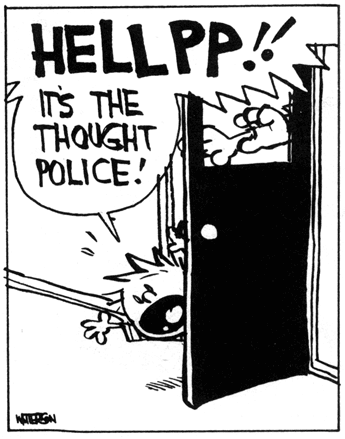The WaPo has an article today on what role Behavioral Economics (training grounds for the Thought Police, in my opinion - and it´s my blog, so I´m right) plays in Obama´s health insurance mandate. Here are a few exerpts that stood out to me (all the bold will be mine, btw):
And the question of whether people will follow a government order that they carry health insurance -- an issue that will help determine whether universal health care is a success or costly failure -- will depend on more than the penalty they would pay for refusing, many economists say. This, they say, is the lesson of behavioral economics, a school of thought that holds that people do not necessarily make decisions out of well-reasoned self-interest. It is an approach that has gained a powerful foothold in the Obama White House.
Shocker, huh? A theory that implies people need an outside source to tell them how to reason well plays heavily in policy making in the Obama White House (follow that link).
As the behavioral economists see it, compliance will depend not only on the penalties [of non-compliance, that is] and cost of [mandated] coverage, but also on the ease of signing up for coverage and whether people can be persuaded that it is a widely accepted social norm. They point to the large number of eligible people who fail to take advantage of Medicaid, food stamps and Pell grants as a sign that perceived inconvenience can keep people from taking steps in their economic interest.
Note they only consider it possible that American´s reject government handouts due to "perceived inconveniences". It couldn´t be that most of us would rather wipe our own asses with a corncob than take money out of someone elses pocket so we can go buy some Charmin.
You can read the whole article here. There is one voice of reason quoted on the second page of the article in closing
Given the outlines of the emerging bills, Richard Zeckhauser, a Harvard economist who has worked with many of the White House economists, says he is unconvinced that it will be in the interests of many young people to comply. And he questions whether the government should use behavioral economics to persuade them otherwise.
"We can think of ways of mesmerizing them into buying things they shouldn't buy, but I don't think government can be in that role," he said.
Unfortunately, Obama doesn´t only think it can, but that it should.

